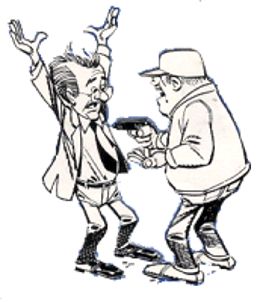|
Fighting
this kind of subterfuge aimed at domain owners
is one of the key reasons that the Internet
Commerce Association (InternetCommerce.org)
was formed and why we have repeatedly urged domain
owners to wake up and act in their own best
interests by supporting the non-profit trade group
(I serve on the organization's board as an
independent director). Regrettably, only a tiny
fraction of industry companies and concerned
individuals have stepped up thus far but
those who have taken up positions on the front
line have already made a difference, because if
they had not done so it's likely this bill
would have gone through unnoticed.
| Instead,
the ICA's Washington D.C. based
Legal Counsel and lobbyist Phil Corwin spotted
the trojan horse hidden within this
bill and sounded the alarm. The
ICA
response to the proposed bill
was posted at InternetCommerce.org
today. The opening paragraphs from that
statement are especially important for
understanding what is at stake with the
Snowe bill (S.2661):
"Internet
Commerce Association strongly supports
efforts to thwart trademark infringement,
criminal phishing schemes, and the
furnishing of inaccurate WHOIS database
information. S. 2661, however, contains
provisions that are largely unrelated
to these objectives and that radically
and unnecessarily expand the rights of
trademark owners to essentially provide
them with monopoly rights on registered
trademarks |

ICA
Legal Counsel Phil Corwin |
| to
the detriment of millions of
individuals and businesses engaged in
lawful and legitimate Internet
commerce.
Moreover,
the proposal goes far beyond protecting
trademarks to covering brand names and
business names that might otherwise not be
entitled to trademark protection. Such an
expansion flies in the face of established
trademark law, poses significant risks to
Internet commerce, and would be burdensome
on our justice system. ICA believes that
the legislation can be perfected to
eliminate these risks without hindering
its ability to achieve the goal of
preventing phishing and other fraudulent
schemes that plague Internet commerce. |
ICA is firmly
opposed to the criminal activity of financial data
phishing and will carefully review the portions of
this legislation relevant to eradicating that
activity with a view toward supporting those
provisions that fill essential gaps in existing
law.
However, ICA is
also firmly opposed to the establishment of a
parallel domain name infringement enforcement
scheme that is more expansive and more onerous
than the existing, highly effective remedies
available to trademark owners through ICANN’s
UDRP process and U.S. trademark law.
Trademark owners already prevail in 85% of
all UDRP complaints and nearly 100% of all
ACPA cases. Yet some apparently now wish to
establish a new regime for contesting allegedly
“infringing” domains that is tilted even
more in their favor by denying basic due process and
substantive protections to domain name registrants
– and that provides the possibility that they
can use their power and influence to sway public
officials to expend taxpayer dollars in defense of
private intellectual property rights.
|

|
The
overbroad and unnecessary trademark-like
provisions of this bill are a recipe
for massive reverse domain name hijacking
by large corporations and are
therefore a direct threat to the more than
$10 billion in asset value created
by the entrepreneurial ranks of
professional domain name investors and
developers, and to the beneficial goods,
services, and information provided to
consumers through their websites.
ICA will
work with the bill’s sponsors and other
members of the Senate Commerce
Committee with an eye toward
eliminating or narrowing these unnecessary
and duplicative provisions and assuring
that any final legislation is focused
solely on the criminal financial fraud of
true phishing schemes".
In
another key passage, the ICA response
notes "This legislation was endorsed
at |
| introduction
by the Coalition
Against Domain Name Abuse (CADNA),
an organization of major brand owners that
has consistently exaggerated the
extent and negative effects of
“cybersquatting” and has advocated a
hyper-expansive view of the rights of
trademark owners vis-à-vis domain name
registrants.
If
enacted this bill would allow trademark
and brand owners to encourage state and
federal officials to bring what are in
essence trademark infringement suits on
their behalf without any need to allege, much
less prove, that the targeted domain
names were in any way involved with
criminal phishing activities. It would
also allow trademark owners to abandon use
of the UDRP process and the ACPA since
alleged “cybersquatting” could be
targeted with lawsuits brought under this
proposed law, with a lower burden of proof
and the coercive power of far more
substantial monetary penalties." |
The introduction
of this bill underscores how critical it is for
domain owners to be represented in Washington. If
you don't have a presence
to look out for your interests there you are
essentially invisible. Do the smart
people who recognized the domain opportunity when everyone
else missed it really want to remain invisible?
Do you want to let latecomers walk in now and take
away your assets?
| The
fact is the small handful of people and
companies who formed the Internet Commerce
Association are not going to keep paying
the freight for everyone else who is
content to sit on their hands and hope the
problem goes away. It is time to join
the fight and protect what you have earned
through your foresight and sizeable
investment in this space, or accept the
consequences and say "oh well, it
was fun while it lasted".
There is
much more in the full ICA response,
including a detailed summary of the
legislation, so I urge to read it in its entirety.
You can also find the full text of the
bill in this .pdf
document. The challenge for everyone
in the domain business now is to contact
the bill's sponsors and their own
congressional representatives (as the ICA
and its members will do) to get the
language in this bill rectified so that
the legislation can target the phishing
epidemic without killing innocent
bystanders like generic domain owners. |

Being
invisible might be cool in the
movies, but in Washington, D.C.
- not so good.
|
I love to write
about domains but I don't have much interest in
writing obituaries. I hope the last story I
write about this industry doesn't become
one. |

